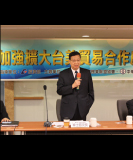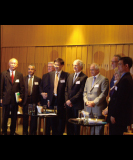You are browsing > Service Trade > Trade Info
Hungary enables the establishment and funding of businesses by lowering tax rates and rewarding industry-education cooperationTaiwan External Trade Development Council
Source:Taiwan External Trade Development Council
According to the Hungarian media, officials of Hungary’s Ministry of Foreign Affairs and Trade announced that by lowering tax rates and rewarding industry-education cooperation, the government is encouraging the establishment and funding of businesses, which will ultimately boost incomes, benefit companies and workers, attract foreign investment, promote the country’s industrial and economic development and improve competitiveness.
The Hungarian government facilitated a three-party coalition between trade associations, workers, and employers, and reached a mutual decision to implement the Six-Year Wage Agreement, which cuts back social tax rates for businesses and workers, and reduces corporate income tax to 9%, starting 2017. Now a year later, workers’ real incomes have grown, companies have gained profits, and foreign businesses have made additional investments or moved their operating headquarters to Hungary. This achieved a three-way win in the effective development of the country’s industrial and economic conditions, and has improved competitiveness.
Ministry of Foreign Affairs and Trade officials point out that by lowering social tax rates, the government is in effect providing individual employees with an average subsidiary of EUR 3,000. Beyond taxation benefits, the Hungarian government provides 60% aid for on-the-job training to improve the proficiency and professionalism of workers in remote areas, bridge rural-urban worker technology gaps, and increase worker incomes.
Hungary is currently working with large German companies to introduce the dual vocational education and training system, and establish University-Industrial Centers, the most well-known being the collaborations between Mercedes Benz and Kecskemét College, and Audi and Széchenyi István University Győr.
To further boost competitiveness, Hungary has been developing additional investment incentives since 2017, and specifically for establishing R&D centers in the country’s capital, Budapest. The Hungarian government has not previously provided incentives for investments in the vicinity of the capital.
Hungary is strategically situated in the heart of Central Europe; and with the government working proactively in line with international investment trends, its core automotive industry has doubled in value since 2010. Opel is now in discussions regarding the establishment of a new plant in Hungary, while the world’s top 45 automotive parts manufacturers and suppliers have factories there.
Source: Economic Division, Taipei Representative Office in Hungary
WebSite









